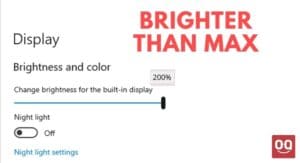There are so many situations when you may have to use a different charger. It is not uncommon for people to have dozens of chargers around, and people often pick any of those when their original chargers break. Also, some people get a new charger for their laptops.
However, in most cases, laptop users end up buying a lower wattage charger for their laptops. And they often seem to ask the question “can I use a lower wattage charger for my laptop?”
The short answer to this question is that it shouldn’t be a problem using a lower wattage charger as long as several other conditions are met. For example, there needs to be a match between the connector and the laptop, and the amperage is supposed to match or exceed the laptop’s amperage.
Besides, there are so many other things that must be taken into account before using a lower wattage charger. Also, you have to take some precautions since using lower wattage chargers might cause some issues.
So, keep reading the article to the end for better knowledge.
Chargers are measured by their wattage, a measurement of the amount of power they need over time. It determines how much power a device uses and needs, so the charger should provide the same or greater amount of power.
Read: Best Laptop without Bloatware
Since every charger varies in wattage, they are classified by the number of watts they produce. Depending on the wattage, some chargers are “lower wattage” and some are “higher wattage”. If you don’t know the wattage number of your charger or laptop, check user manuals.
You might be thinking that why a higher wattage charger doesn’t cause any problem. Well, this is because, a device will only take in the wattage it requires, even though the charger can supply more. For example, an iPhone charger puts out 5W, but you can charge an iPhone with a 10W charger because it will only take 5W.
How does a laptop power supply work?
Before I answer the main question, you should have a bit of knowledge about the power supply of a laptop. To make it easy for you to understand, let’s compare your laptop’s power requirements to the need for lighting in your room. If the bulbs in your room don’t get the power they require, they will produce dimmer lights. They will not be so effective.
Read: Best Normal Looking Gaming Laptops
Likewise, laptops are designed to withstand the worst conditions when charging. If they don’t get enough power, they won’t run smoothly. However, there are some laptops that can run normal programs smoothly but won’t be able to run high-power consuming programs.
When you plug your laptop charger into the wall socket, it converts the AC power to DC power and reduces the voltage. Then it transmits the DC power to your laptop’s motherboard and the motherboard distributes it to other components. The laptop battery also stores this power to give the laptop back up while it is not connected with any power source.
Can i use a lower wattage charger for my laptop?
Yes, you can use a lower wattage charger to charge your laptop, but it may create some difficulties while working. You will notice a significant drop in performance because of this. For example, if you have a 90W laptop but you use a 45W charger to charge it then it won’t get the power it requires and may not function at its best.
However, this also depends on what activities you are performing on your laptop. For example, a lower wattage charger is able to suffice if you use your laptop to perform low-power tasks such as reading articles and writing with minimal brightness level and lower volume. On the other hand, if you run high-power consuming applications such as Adobe Photoshop or watch videos at high volume, the power coming from your charger will not be sufficient.
Also Read: Why do gaming laptops have bad battery life?
When you perform more power-demanding applications, your laptop will reject the power coming from the charger and use battery power instead. And since a lower wattage charger cannot fulfill the power demand, the laptop will shut down automatically once the battery is dead.
In simpler words, it would more likely frustrate you to use a low-watt charger for your laptop than to be of use to you. In fact, it is recommended by professionals to not use a lower-wattage charger. Also, it takes longer to fully charge a laptop with lower-wattage chargers.
Is it bad to use a lower wattage charger?
The short answer to this question is YES, using a lower wattage charger can directly impact your laptop’s performance. Here I am going to mention few disadvantages of using a lower wattage charger for a laptop.
1. Damage components
Using lower wattage can cause fuse in the power supply unit and damage other components. Also, it puts a significant impact on the laptop’s battery and the laptop will start draining the battery at a faster rate. In addition, a lower wattage charger will also result in a power shortage which may cause your laptop’s internal components to burn out as they will be trying to get more power, but unable to get it.
2. Overheating
Another problem that laptop users usually face when using a lower wattage charger is overheating. A lower wattage charger takes longer to fully charge the battery, so it gets hotter. In addition to reducing your laptop’s performance, the overheating issue may also damage your device in other ways.
However, if you experience overheating frequently then you can read our article on how to keep a laptop cool while working.
3. Performance
As a result of using a lower wattage charger, you will notice a slight performance drop in your laptop, because your laptop components are not getting the power they require to run properly. When you run games or power-demanding software, your laptop will crash. So, if you want better performance, use a charger recommended by your laptop’s manufacturer.
Can you use a higher wattage charger?
As I have mentioned earlier, wattage is a measurement that defines how much power a device needs. During charging, one or more Watts are delivered in response to the battery’s demand, so even if you charge it with a higher wattage charger, there will be no issues.
For instance, if you charge a 45-Watt laptop with a 90-Watt charger, the laptop will only draw 45 watts of power from the charger. So, using a higher wattage charger is completely fine. But make sure the amps and voltage match.
FIX: Laptop not charging while gaming
Moreover, using a higher wattage charger will prevent your laptop from overheating and you will have a smooth experience. Also, you don’t have to compromise with the performance.
So, in simpler words, using a higher wattage charger to charge a laptop is completely okay. However, you should check the amperage as well. It refers to how much electricity flows to your laptop at a time. If the amps don’t match, it should be higher.
Conclusion
So, now you have enough knowledge of the consequences of using a lower wattage charger. It can greatly affect your laptop performance and can cause overheating. But, if you have no other alternative then you can use it.
On the other hand, it is completely fine to use a higher wattage charger. Because your laptop is going to draw the power it requires to run. You won’t even experience any performance drop or overheating.
In this article, I have tried to include everything that you need to know about the wattage of laptop chargers. In my opinion, you should not always use a lower wattage charger. Your precious device will, though, be at risk of serious damage if you continuously use a lower-wattage charger.
I hope the article answered the question. If you are a frequent traveler then should check out our article which reviews some of the top-rated power banks for laptop.
Thanks for being with us 🙂





